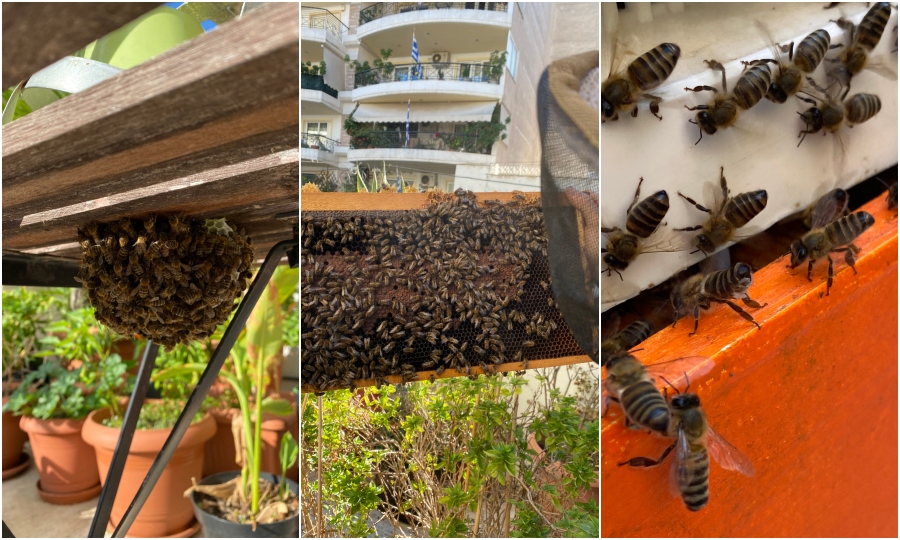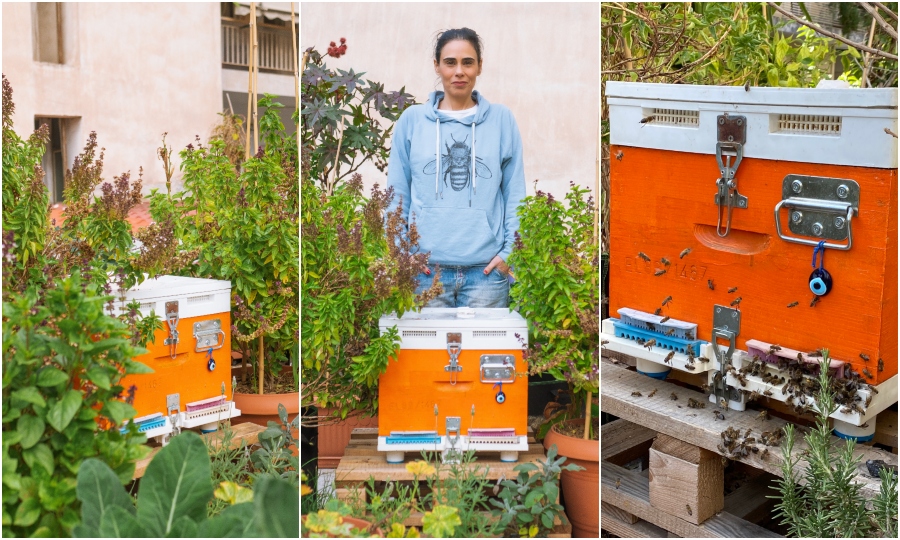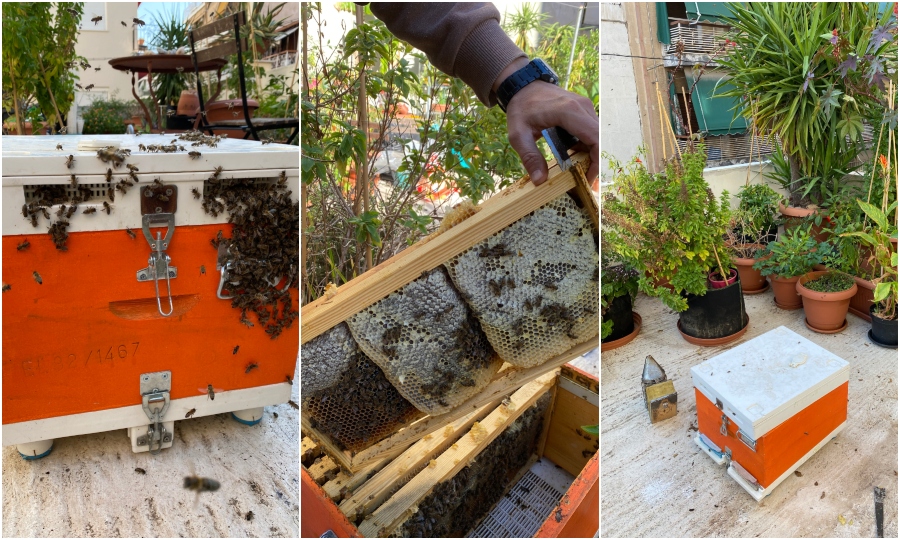Andreas Karamitas
Dimitra Zakynthinos is a resident of central Athens and has a very particular approach to issues concerning the environment and our transition to the green era. For Dimitra, Urban Sustainability and the movement for Nature Positive Cities has become her life's purpose, even if it is not her main profession (she works as a copywriter and Creative Director). However, what motivated us for this article is the fact that along with her activities, she is also a beekeeper or beeswoman as she prefers to be called. Beekeeping came into her life when she discovered a small swarm that had settled under a table on her terrace in the center of Athens. In early winter, she and a beekeeper friend of hers moved the swarm to a classic wooden hive to protect them from the rain and cold. However, she says with a smile "Since the beehive came to the roof, my life has become richer. I saw daily the selfless giving, the cooperation, the self-sacrifice, the love that transmutes everything. My relationship with bees changed forever and my love for them made me a better person."
Asked by "K" what motivated her to work with bees, especially in the center of a capital city that does not offer adequate infrastructure for their welfare, she said that her efforts are to convey to all people the beauty, love, preciousness, and the sanctity embodied by such a small creature. She goes on to say that "the bee only gives love, and gives it all the time. It works tirelessly throughout its short life to give, transmuting sunlight, nectar and pollen". Although she believes that all beings on the planet should live their own lives and perform their sacred purpose while not judging any species as useful or not, the bee is an insect of immeasurable importance to human survival.
Regarding the bee's contribution to the environment, Dimitra says it is very great, especially for pollinating plants. Considering that 70% of pollination is done by bees, without their presence plants and trees could not bear fruit. A world without bees would be like a skeleton. So rather than fearing them, it is better to love them, respecting their peculiarities.
Bees need love, not fear
To the question of why there is no reason to fear bees and how they can cohabit together without stinging her, Dimitra mentioned that bees will never attack without reason. Only when its life, or its hive, is in danger, which makes sense since inside the hive is its queen and brood, which is the future of the hive. "We would do exactly the same thing if someone invaded our home or threatened our children." A typical example was the fire in Dadia where beehives and its entire population of bees were destroyed after the bees preferred to burn with their brood rather than abandon them.
The green transition of cities will bring back the bees
As for practical ways to help bees, the first and most important thing one can do is to have flowers. Dimitra goes on to say that "there is no bee and no life without flowers. There is no longer a natural environment for bees and pollinators in general, so we urgently need more gardeners. The green transition of cities will bring bees on their own. Plant flowers, and herbs, even have a 1x1 balcony, put in pots of thyme, basil, rosemary, and sage and let them bloom. In the Mediterranean all our herbs are ideal. You use them for cooking and helping the bees. If you don't have a garden, turn pieces of land that are not being used into gardens and bastions - either on your own or in cooperation with your neighbors - so it will be good for the bees and you'll have your own vegetables. Also equally important is not to use pesticides because they kill them (there is no such thing as an innocent chemical) since they kill us along with them. There is endless research proving the high levels of pesticides in our air, land and water and how destructive they are to our health. Additionally, on hot days, put some fresh water in a petri dish for them to drink. Also, I am often asked what to do if I see a bee that is not moving. Put it in the sun, on the nose of the toothpick put a drop of honey to eat to get strength, and if it's winter, put it inside for a while to warm up until it comes alive. Many times bees are "frozen" by the cold and take a while to recover. In general, though, let the bees do their work undisturbed. The nature of the bee was and will remain wild, it will never be tamed, fortunately for us and we help them if we leave them alone."
Bees in the city
When asked about the idea of having a beehive in the city, she responded that urban beekeeping is a highly controversial issue for various reasons. One of them is the fact that the honey bee, known as Apis mellifera, occupies space that could benefit other pollinators, leading to a significant threat to biodiversity and the potential extinction of other insect species. Another crucial aspect is recognizing that bees are living organisms with responsibilities that require care and ample affection. Establishing a beehive is not a simple task; it demands ensuring there is sufficient flowering throughout the year and investing time and effort into the bee's well-being if not left to its own devices. For those motivated solely by the prospect of honey, she suggests reconsideration. Above all, bees require love and respect, advocating for a shift from a human mentality of exploitation to one of cooperation and mutually beneficial symbiosis. She shares, "Personally, I don't even take honey from the 'girls.' Many people are unaware that honey is produced by bees, primarily for their benefit, playing a crucial role in their survival, health, and immunity. The truth is, when the bees arrived at my house, it was a gift, and from the beginning, I decided that if all went well, I would not take their honey away from them. It was my gift to them."
What about the honey they produce?
"If we desire to consume honey, it is wiser to opt for less, yet superior quality honey—albeit pricier—rather than consuming large quantities of honey with uncertain quality from apiaries whose treatment of bees remains unknown. Our preference generally lies with supporting smaller beekeepers. The most conscientious and genuinely professional beekeepers undertake one of the most challenging occupations with meager compensation. Assigning a monetary value to a product that has resulted in the sacrifice of thousands of bees is impossible. Each worker bee, with a lifespan of 1-6 months, produces only 1/3 of a spoonful. Equally incalculable are the expenses, the constant journey from one bloom to another, the relentless stress from pesticides on crops that harm the bees, and the challenges posed by diseases like nosema, parasites, particularly varroa, responsible for the devastation of millions of bees worldwide. The unpredictable weather conditions and extreme events, ranging from prolonged summers and heatwaves to floods and fires, further emphasize the invaluable challenges faced by these dedicated beekeepers."
How much does it cost to maintain a beehive?
Demetra enlightens us on the fundamental costs of beekeeping, involving the purchase of hives and frames, travel expenses for flower hunting, treatments, and bee nourishment if there arises a need to "feed" the bees. She notes, "I only had to do it during the first winter, but as spring arrived with blooms, it became unnecessary. The decision to intervene in the beehive and administer treatments depends on various factors (it is understood that beekeepers typically administer treatments). Personally, I disapprove of harsh chemical interventions due to their long-term harm to the bees. There are alternative natural treatments, though not a cure-all. Bees are dynamic creatures, living organisms facing numerous adversaries, both natural and artificial/chemical, and no fixed recipes exist. Even with meticulous care, a bee may be lost as various unforeseen events can occur. Achieving balance is crucial, and human intervention, while aiming to offer solutions, often exacerbates the situation. Bees inherently understand what is best for them better than we do."
If you want to learn more about bees and urban sustainability, you can follow Demetra on Instagram @beesinthecities / @dimitraz.
[This article was translated from its Greek original and edited for brevity and clarity]

































